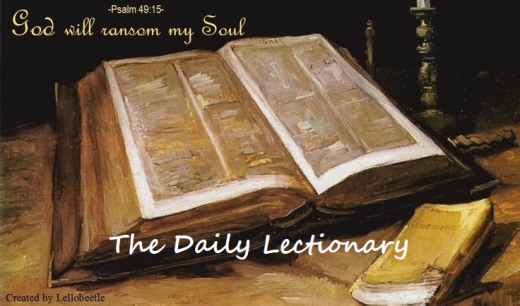The Daily Lectionary
MONDAY, November 11, 2019
(Revised Common Lectionary Year C)
(Semi-continuous Reading Plan)
(Earth sees the victory of God)
Praise the Judge of the World
A Psalm.
1 O sing to the Lord a new song,
for he has done marvelous things.
His right hand and his holy arm
have gotten him victory.
2 The Lord has made known his victory;
he has revealed his vindication in the sight of the nations.
3 He has remembered his steadfast love and faithfulness
to the house of Israel.
All the ends of the earth have seen
the victory of our God.
4 Make a joyful noise to the Lord, all the earth;
break forth into joyous song and sing praises.
5 Sing praises to the Lord with the lyre,
with the lyre and the sound of melody.
6 With trumpets and the sound of the horn
make a joyful noise before the King, the Lord.
7 Let the sea roar, and all that fills it;
the world and those who live in it.
8 Let the floods clap their hands;
let the hills sing together for joy
9 at the presence of the Lord, for he is coming
to judge the earth.
He will judge the world with righteousness,
and the peoples with equity.
(A rebuke and a promise)
A Rebuke and a Promise
2:10 On the twenty-fourth day of the ninth month, in the second year of Darius, the word of the Lord came by the prophet Haggai, saying: 11 Thus says the Lord of hosts: Ask the priests for a ruling: 12 If one carries consecrated meat in the fold of one’s garment, and with the fold touches bread, or stew, or wine, or oil, or any kind of food, does it become holy? The priests answered, “No.” 13 Then Haggai said, “If one who is unclean by contact with a dead body touches any of these, does it become unclean?” The priests answered, “Yes, it becomes unclean.” 14 Haggai then said, So is it with this people, and with this nation before me, says the Lord; and so with every work of their hands; and what they offer there is unclean. 15 But now, consider what will come to pass from this day on. Before a stone was placed upon a stone in the Lord’s temple, 16 how did you fare? When one came to a heap of twenty measures, there were but ten; when one came to the wine vat to draw fifty measures, there were but twenty. 17 I struck you and all the products of your toil with blight and mildew and hail; yet you did not return to me, says the Lord. 18 Consider from this day on, from the twenty-fourth day of the ninth month. Since the day that the foundation of the Lord’s temple was laid, consider: 19 Is there any seed left in the barn? Do the vine, the fig tree, the pomegranate, and the olive tree still yield nothing? From this day on I will bless you.
(Prophecy comes not by human will)
Eyewitnesses of Christ’s Glory
1:16 For we did not follow cleverly devised myths when we made known to you the power and coming of our Lord Jesus Christ, but we had been eyewitnesses of his majesty. 17 For he received honor and glory from God the Father when that voice was conveyed to him by the Majestic Glory, saying, “This is my Son, my Beloved, with whom I am well pleased.” 18 We ourselves heard this voice come from heaven, while we were with him on the holy mountain.
19 So we have the prophetic message more fully confirmed. You will do well to be attentive to this as to a lamp shining in a dark place, until the day dawns and the morning star rises in your hearts. 20 First of all you must understand this, that no prophecy of scripture is a matter of one’s own interpretation, 21 because no prophecy ever came by human will, but men and women moved by the Holy Spirit spoke from God.
Optional parts of the readings are set off in [square brackets.]
The Bible texts of the Old Testament, Epistle and Gospel lessons are from the New Revised Standard Version Bible, copyright 1989 by the Division of Christian Education of the National Council of the Church of Christ in the USA, and used by permission.
The Daily Lectionary is a three year cyclical lectionary. We are currently in Year C. Beginning with the first Sunday of Advent in 2019, we will be in Year A. The year which ended at Advent 2018 was Year B. These readings complement the Sunday and festival readings: Thursday through Saturday readings help prepare the reader for the Sunday ahead; Monday through Wednesday readings help the reader reflect and digest on what they heard in worship. Revised Common Lectionary Daily Readings, copyright © 2005 Consultation on Common Texts. www.commontexts.org
The Daily Lectionary for MONDAY, November 11, 2019
Psalm 98; Haggai 2:10-19; 2 Peter 1:16-21












